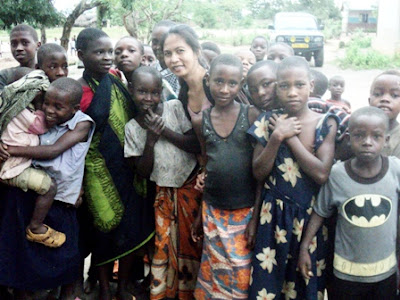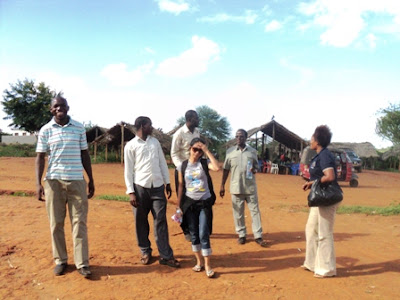After a year, I had the opportunity to revisit Handeni. I was there 2 weeks ago for 6 days to participate in the consultative meetings with the stakeholders of CAN’s (my organization) new project called “TUNAWEZA” (It’s a Swahili word which means “We can” in English). I also took the opportunity to survey some primary schools with Orphans and Vulnerable Children (OVC) in the Handeni Town for my small project funded by VSO Tanzania. And a week ago, I was there again for 7 days to implement my OVC project and to assist a colleague to design some tools for the baseline data and Monitoring and Evaluation (M and E) of the TUNAWEZA project.
 |
| common sight in Handeni - they are so young to do this but they have to |
 |
| During the survey of primary schools with OVC in Handeni Town I want to have a picture with the children but they ran away |
 |
| Finally, they agreed to have a picture with me |
The first time I travelled there last year, the road was totally dusty and bumpy. Now, the road is under construction. Some portions (maybe 75%) are already paved but not passable yet. The span is not more than 70 kms. to Handeni Town (just after the well paved road from Dar es Salaam; the total distance from Dar to Handeni Town is approximately 128 point something according to the google map).
 |
| excavated area beside the road |
From the bus window, I saw the same sights I witnessed during my 1st visit. I was engrossed of my thoughts when my colleague asked me to observe well on the areas that we will be passing through. When he asked me again, I said, there’s a sign of progress as the district is becoming accessible through the newly improved road. But what he was trying to point out are the excavated areas beside the road where some segments are with visible glittering matter which I thought maybe an effect of the sunlight rays. He said that they are actually remnants of gold. Well, perhaps he is right. Since 2009, a foreign-owned company is engaged in gold mining explorations in the district located 35 kms. south of the Handeni Town (http://www.canaco.ca/). And some of the locals claim that there are new exploration foreign companies in the area.
I tried to search the web the specific number of these exploration companies but there is none. But I saw at least 6 different names of companies that are granted of a license to operate in the area.
I tried to search the web the specific number of these exploration companies but there is none. But I saw at least 6 different names of companies that are granted of a license to operate in the area.
 |
| The Magambazi Hill in Handeni - this is the area of the on-going mining exploration activities |
So, the most logical reason of this road improvement is the existence of the gold mining explorations activities in the district – which is not bad. It will surely create business activities and opportunities in the area. But I hope, it will benefit the locals and their environment will not be exploited.
Still Hamna Maji (No Water) in Handeni
 |
| The bucket with tea-color water at my bathroom |
Throughout my visits, I stayed in the same hotel. Every day and every night, I had to pester the staff at the hotel’s reception to bring me maji moto (hot water) for my bath. One time, I was so annoyed that I had to remind the reception 3x to give me hot water for my morning bath and I had to go down from my room (located at the 2nd floor of the hotel) to go and tell them what I need. I forgot to push my tolerance and patience button at that time and had to remind myself always on the most common comment of mzungus (foreigners) living in Tanzania - “everything is pole-pole (very slow/no urgency) in Tanzania” .
Meat(Nyama) or Kuku (chicken) for Every Meal
 |
| waiting for our roasted goat - for our lunch |
The environment in Handeni is conducive for Pastoralism because of the vast areas of lands and hills densely vegetated with trees and grasses.
 |
| the green surroundings in Handeni |
 |
| a maasai pastoralist selling his cattle |
 |
| a typical maasai hut |
Therefore, the widely available food is just purely meat – beef, goat’s or sheep’s meat and indigenous chicken which is also very popular. Every lunch or supper – no other choice but only meat. The locals rarely or never eat fish, vegetables and fruits.
 |
| with CAN Associates Family - after eating the roasted goat |
Cold, wet or cloudy and Konyagi or Pombe or Bia
The cold climate is so conducive to have pombe (alcohol drink) or konyagi – a local brand of alcohol beverage which has more than 30% alcohol content or beer (bia) anytime of the day especially during the night.
The TUNAWEZA Project and HIV/AIDS
The objective of TUNAWEZA is to mitigate the prevalence and impact of HIV/AIDS among the women, youth and young girls (adolescents). It is a project with muti-sectoral approach and strategies that include psychosocial services, social protection and network, HIV/AIDS counselling/ testing and skills development specifically entrepreneurship. Based on the UHAI-CT (Universal HIV/AIDS Intervention – Counselling Testing) project of CAN in Handeni District, 72% of the HIV/AIDS MARPs (Most-at-Risk Persons) clients are youth from 14-30 years old.
 |
| These young people volunteered themselves to undergo HIV/AIDS Counselling and Testing |
 |
| with the young people who were Counselled and Tested of HIV/AIDS |
During the consultative meetings with the stakeholders, the FBOs (Faith-based Organizations) raised their concern on the effect of promoting safe sex (e.g. use of condom) to prevent the spread of HIV/AIDS. They said that it encourages the youth to engage in pre-marital sex –– it’s about morality that people with religion convictions considered this (pre-marital sex) as a grave sin.
How about our responsibility as adults? We can never dictate young people what they should do about their lives but we can guide them and present them the pros and cons of their actions or choices they want to have.The OVC
 |
| with the OVC and my colleague Redempta (CAN Associates) |
Through individual donors in Tanzania, the VSO Programme Office was able to provide me a fund of GBP 500 to distribute school supplies (uniforms and assorted school items) to 90 OVC in Handeni Town. It was so touching to see the happy faces of the children after they received their school supplies.
 |
| My colleague, John (CAN Associates) during the distribution of schools supplies to the OVC |
The Market
It was Sunday and my colleague toured me around the Handeni Town Market. Everything is there – live chicken, vegetables and fruits (nice to see those but I have no idea why locals here rarely eat them), cooked fish, mtumba (second hand or old) goods, etc. |
| mtumba footwear |
 |
| live indigenous chicken |
 |
| peeled mbe (mango) with chili salt |
 |
| maasai sandals |
 |
| no buyers yet? |
Back to Dar
Now in Dar. It’s a totally different atmosphere – the noise, busy streets and humid weather did not immerse to my system for a while. But I realized how I missed the pleasure of washing my face every morning from a faucet with cold running water.
In life, there are trade-offs. It is suffice to say that we can’t have everything in this world.
 |
| What would be his answer if he would be asked to choose 1; "Pot of Gold or Well? " |



hey you....i missed you ate.
ReplyDelete